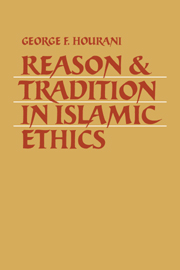Book contents
- Frontmatter
- Contents
- Preface
- Foreword by Michael Marmura
- Conventions
- Titles and locations of the original articles
- Introduction
- 1 Islamic theology and Muslim philosophy
- 2 Ethics in classical Islam: a conspectus
- 3 Ethical presuppositions of the Qurʾān
- 4 ‘Injuring oneself’ in the Qurʾān, in the light of Aristotle
- 5 Two theories of value in early Islam
- 6 Islamic and non-Islamic origin of Muʿtazilite ethical rationalism
- 7 The rationalist ethics of ʿAbd al-Jabbār
- 8 Deliberation in Aristotle and ʿAbd al-Jabbār
- 9 Ashʿarī
- 10 Juwaynī's criticisms of Muʿtazilite ethics
- 11 Ghazālī on the ethics of action
- 12 Reason and revelation in Ibn Ḥazm's ethical thought
- 13 The basis of authority of consensus in Sunnite Islam
- 14 Ibn Sīnā's ‘Essay on the secret of destiny’
- 15 Averroes on good and evil
- 16 Combinations of reason and tradition in Islamic ethics
- Select bibliography
- Index
1 - Islamic theology and Muslim philosophy
Published online by Cambridge University Press: 13 October 2009
- Frontmatter
- Contents
- Preface
- Foreword by Michael Marmura
- Conventions
- Titles and locations of the original articles
- Introduction
- 1 Islamic theology and Muslim philosophy
- 2 Ethics in classical Islam: a conspectus
- 3 Ethical presuppositions of the Qurʾān
- 4 ‘Injuring oneself’ in the Qurʾān, in the light of Aristotle
- 5 Two theories of value in early Islam
- 6 Islamic and non-Islamic origin of Muʿtazilite ethical rationalism
- 7 The rationalist ethics of ʿAbd al-Jabbār
- 8 Deliberation in Aristotle and ʿAbd al-Jabbār
- 9 Ashʿarī
- 10 Juwaynī's criticisms of Muʿtazilite ethics
- 11 Ghazālī on the ethics of action
- 12 Reason and revelation in Ibn Ḥazm's ethical thought
- 13 The basis of authority of consensus in Sunnite Islam
- 14 Ibn Sīnā's ‘Essay on the secret of destiny’
- 15 Averroes on good and evil
- 16 Combinations of reason and tradition in Islamic ethics
- Select bibliography
- Index
Summary
In the early centuries of Islam theology and philosophy were regarded as two distinct disciplines, following their own assumptions and intellectual traditions. ‘The science of dialectic’ (ʿilm al-kalām) meant Islamic theology, derived only from the revealed Quiʾān and the Traditions of the prophet Muhammad. Philosophy (al-falsafa) was a ‘foreign’ science based on natural knowledge and largely inspired by ancient Greek philosophy. As time passed theology and philosophy interacted increasingly, with varying relations in different parts of the Muslim world. But we must begin by describing them as separate, as they generally were until about the eleventh century a.d.
THEOLOGY
All teaching, discussion and writing on this subject were conducted in Arabic, the language of the Qurʾān and of other Islamic subjects such as exegesis and jurisprudence. The principal centres of theology were in Iraq and Iran.
After early discussions on conditions for salvation and the moral qualifications of caliphs the first systematic school, the Muʿtazilites, arose in Iraq in the eighth century, about a century after Muhammad's death (632). Their self-description as ‘the party of unity and justice’ announced their central doctrines.
The unity of God (Allāh) was understood very strictly by them, reflecting the emphasis of the Qurʾān. Polytheism and the Christian Trinity were rejected as a matter of course. The Qurʾān could not be eternal beside God but must have been created by the one eternal being.
- Type
- Chapter
- Information
- Reason and Tradition in Islamic Ethics , pp. 6 - 14Publisher: Cambridge University PressPrint publication year: 1985

